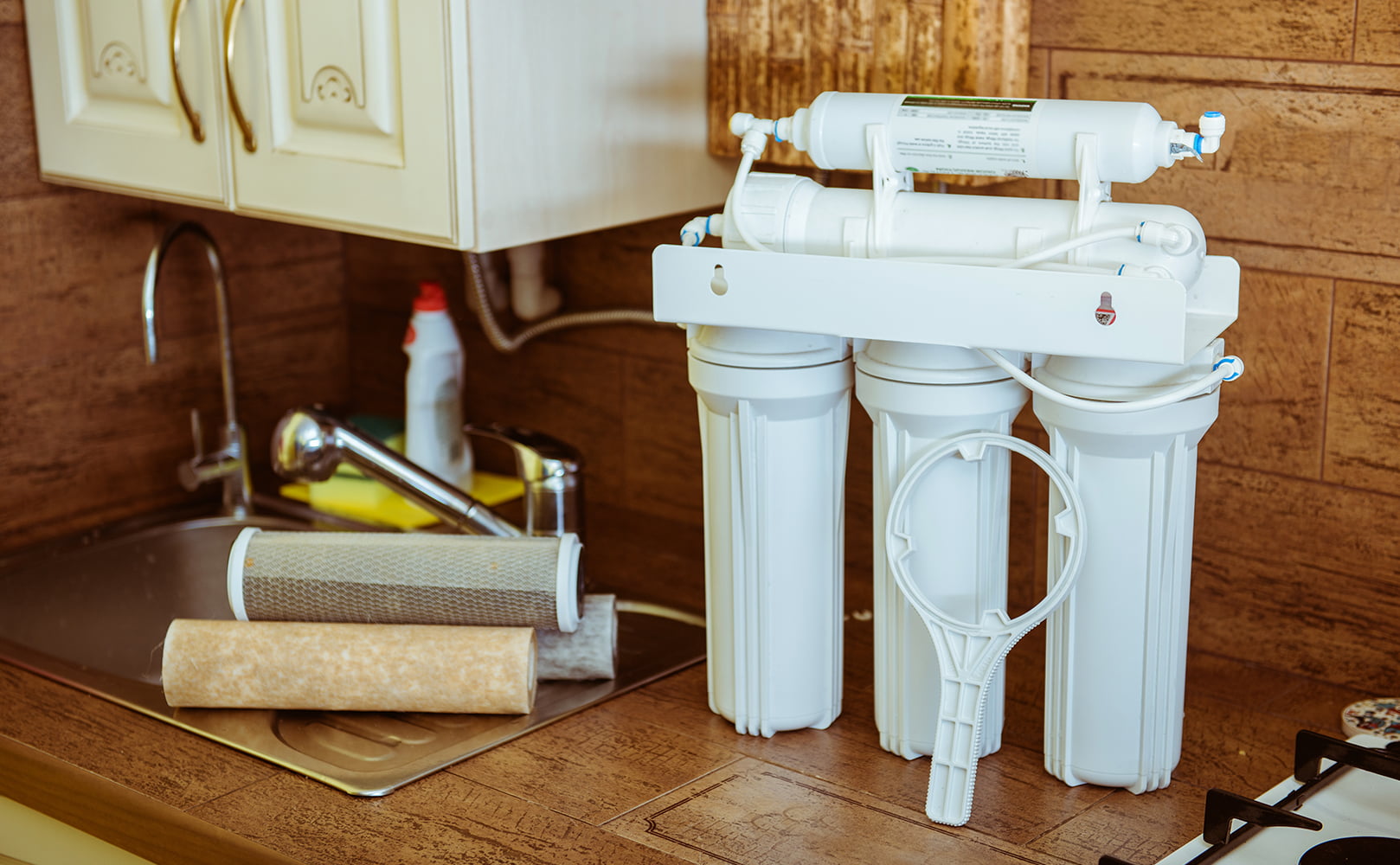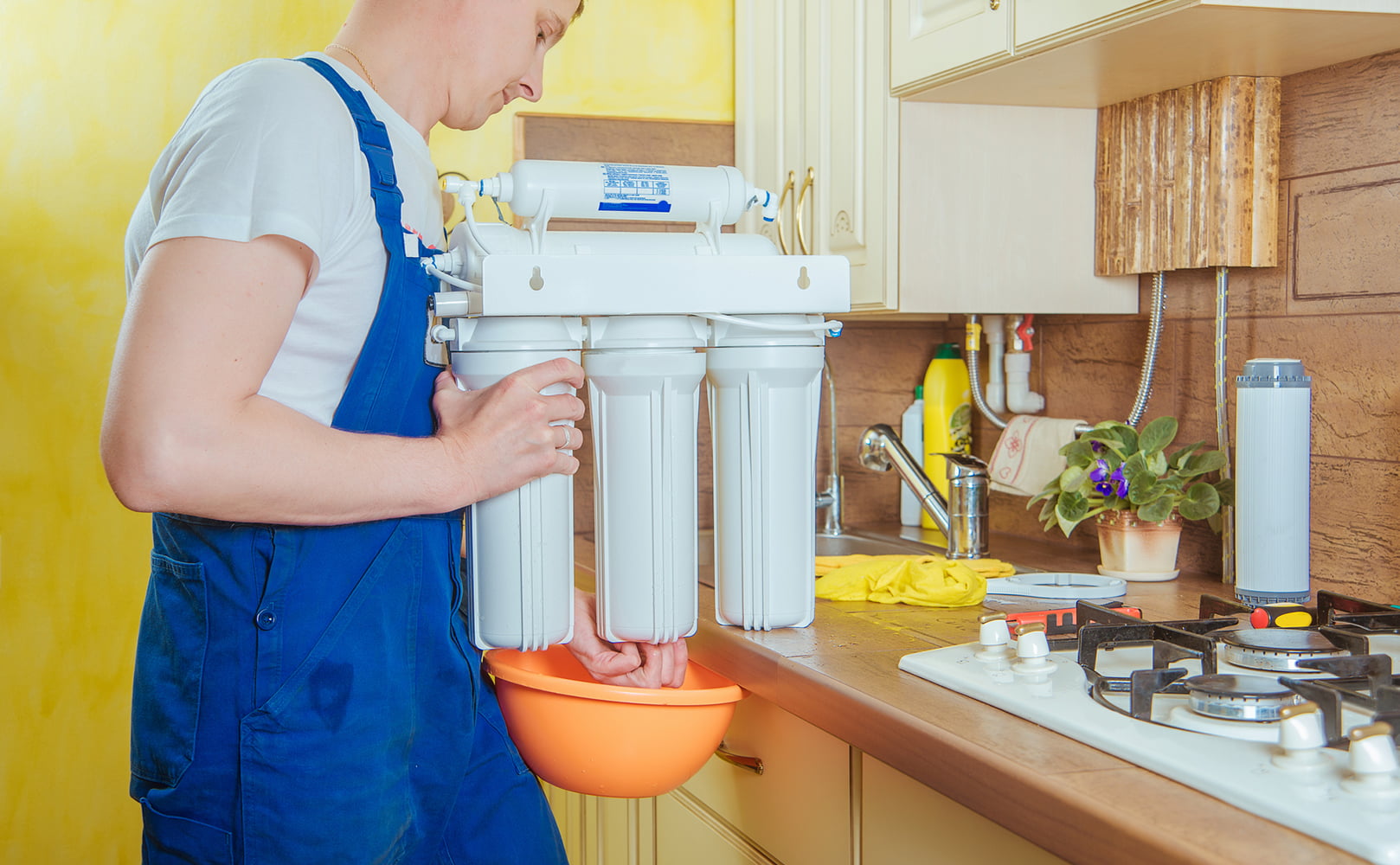How Often Should You Change Your Under Sink Water Filter?
Written by: Gene Fitzgerald // Last Updated: Sep 20, 2022
This page may contain affiliate links. If you buy a product or service through such a link we earn a commission at no extra cost to you. Learn more.
Many people who own under sink water filter systems know how essential it is to replace filters promptly. But what exactly is the correct time to replace a filter?
There is a lot of information online: often contradictory and sometimes confusing.
The thing is, there are multiple types of under sink water filters. Naturally, each one features different filter cartridge lives. Moreover, other external factors affect filter lifespan as well.
Stay with us as we give you a clear guideline for all types of under sink filtration systems.
Key Takeaways
- An under sink water filter typically lasts an average of six months before you need to change it.
- Its lifespan will depend on your water usage, quality, and filtration capacity.
- If the filtered water starts to taste poor or smell unpleasant, is turbid, or has low pressure, it may be time to change your under sink filter.
What Do Under Sink Water Filters Do and What Are Their Benefits?
Under sink water filters are, perhaps, one of the most popular in-house water filtration systems. They are fuss-free, easy to install, and require little to no maintenance – except filter changes.
Most under sink filters do an excellent job of elevating the taste and smell of your water which is the number one problem associated with drinking water.
What’s more, some good-quality multi-stage filter systems are designed to remove a wide range of impurities, including chlorine, pesticides, VOCs, lead and other heavy metals, and more.
In the same way, advanced reverse osmosis under sink water filters can effectively remove salts like nitrates, bacteria and viruses, chromium 6, and many more nasty contaminants.
As a result, your water is high quality and sparkling, just like it should be.
Benefits
Here is why we love these nifty appliances:
- Everyone wants their water to be free of foul odors, slimy texture, and unpleasant taste. If you want to experience how fresh and pure water tastes, an under sink filter is the right way to go.
- Did we mention your water will be free of numerous potentially harmful pollutants? As a result, you can expect a better quality of life and overall well-being.
- Most under sink systems are relatively inexpensive compared to whole house units.
- Similarly, under sink water filter installation is also pretty quick and non-invasive.
- When you bring home an under sink water filter, you will never have to spend another penny on ridiculously expensive bottled water. Imagine the amount of money you can save annually by filtering your own water that is as good as (sometimes even better, no kidding) most popular bottled water brands.
- Unlike water pitchers, another popular filtration gadget, under sink systems filter water on demand. No more waiting around staring at the filter pitcher while it completes the filtration process. Instead, you always have access to filtered water.
- Most under sink water filter systems will last you a good 5 to 10 years.
How Long Do Under Sink Water Filters Last?
Under sink water filter cartridges typically last on average six months before needing replacement. However, the time period could vary considerably due to a number of factors. Calculating the exact replacement time for your filters is essential to avoid changing them too soon (useless expense) or too late (dirty water).
Water Usage
The capacity of a water filter is measured in gallons or a set time frame. Typically, strong and large under sink filters can process 500 to 1000 gallons, or 6 to 9 months of water before becoming too clogged.
Since all households use a different amount of water for cooking and drinking every day, the filter’s life also varies based on that.
To put it simply, a household with a bigger family and pets will require more frequent replacements compared to a single-person home.
Water Quality
Similarly, the water quality in every neighborhood is unique. If your water supply is high in sediment, metals, minerals, etc., filters will clog sooner.
On the other hand, the cleaner your water supply is, the more time your under sink water filter will last before giving up.
Filtration Capacity (Type of Filter Cartridge)
Filter capacity varies between brands and filter types/models. If you use a generic model from the market with poor quality, you might need more frequent replacements.
Tell-Tale Signs a Filter Change Is Needed
Not sure when your under sink filter needs to be replaced? Here are a few giveaways that suggest your cartridge has exceeded its service life.
- Poor taste and smell: If you feel the smelly and foul-tasting water is making a comeback, your filter is to blame.
- Turbid water: Most under sink water filters do a terrific job at removing turbidity from water. Turbidity refers to poor water clarity. It serves as an excellent reminder that the sediment filter is not working.
- Low water pressure: Clogged filters obstruct water flow leading to a decrease in water pressure. If it takes you more time to fill up one glass of water, it’s time to get active. Remember, a slight pressure drop over time is normal and expected.
Why Is Changing the Filter Important?
You may often wonder if you can get away without replacing filter cartridges at the desired time. Or maybe you hate changing your filters repeatedly. But remember: Replacing is not optional – a poor filter is no filter at all!
- Changing the filter or filters of your under sink water system timely is highly essential to maintain water pressure. If your cartridge is full of gunk, it will require more time to filter, trap, or remove contaminants.
- A completely clogged cartridge is unable to eliminate any more impurities. This means you may be exposed to hundreds of different pollutants without even knowing.
- As a result, your family’s health is at risk from ingesting impure water.
- When filters get jammed, the housing can start to leak since the water flow is restricted. You may find yourself in a larger mess and will need to pay added repair cost. Not to mention, the hassle it ensues.
Replacement Filter Cost
Replacement filter costs will vary depending on the type and brand of under sink water filter you choose to buy. Thankfully, you can buy them in sets of two or three, which helps save costs.
We always advise using genuine replacements to avoid poor performance. You may also want to look for NSF/ANSI certifications, which ensures you are getting a good worth of your money.
On average, most replacement filter cartridges are priced around $50 to $100 for a set of two or three, including sediment and carbon filters.
Additional Tips
Here are a few tips and tricks we have learned over the years:
- Use a reminder app, an alarm, or log down the last filter replacement date in a notebook. This little effort will go a long way in helping you identify how long your under sink filters last. Some well-known brands like Brita offer to send you an email when a replacement is due. While it may not be 100 percent accurate, it should help you keep up.
- Some brands like Clearly Filtered have filter subscription services that ensure a filter reaches your home right when you need it. Convenient, isn’t it?
- For some people, under sink water filters will last longer than the recommended time by the manufacturer. Therefore, it is necessary to inspect the cartridge once you remove it out of its sump. If it still looks clean, no need to replace it so often.
You see, manufacturers like to believe it’s better to change early than late. But replacement filters are expensive – frugality, all the way!
- Never consume the water that flows out of the faucet right after a filter change. Instead, let it run for a few minutes to allow the new filter media to prime and remove any excess contaminants on the way. Don’t let it go down the drain, though. Instead, use it to water your plants or for cleaning.
- Don’t wait for the water pressure to slow down before you finally accept a filter is beyond spent. Sometimes, reduced water pressure does not always reflect a clogged cartridge. Besides, there are cases where people noticed increased water pressure when their filters were completely congested.
If you have any questions about how often to change an under sink water filter please don’t hesitate to leave a comment below!
Information provided on BOS is for educational purposes only. The products and services we review may not be right for your individual circumstances.
We adhere to strict editorial guidelines. Rest assured, the opinions expressed have not been provided, reviewed, or otherwise endorsed by our partners – they are unbiased, independent, and the author’s alone. Our licensed experts fact-check all content for accuracy. It is accurate as of the date posted and to the best of our knowledge.



